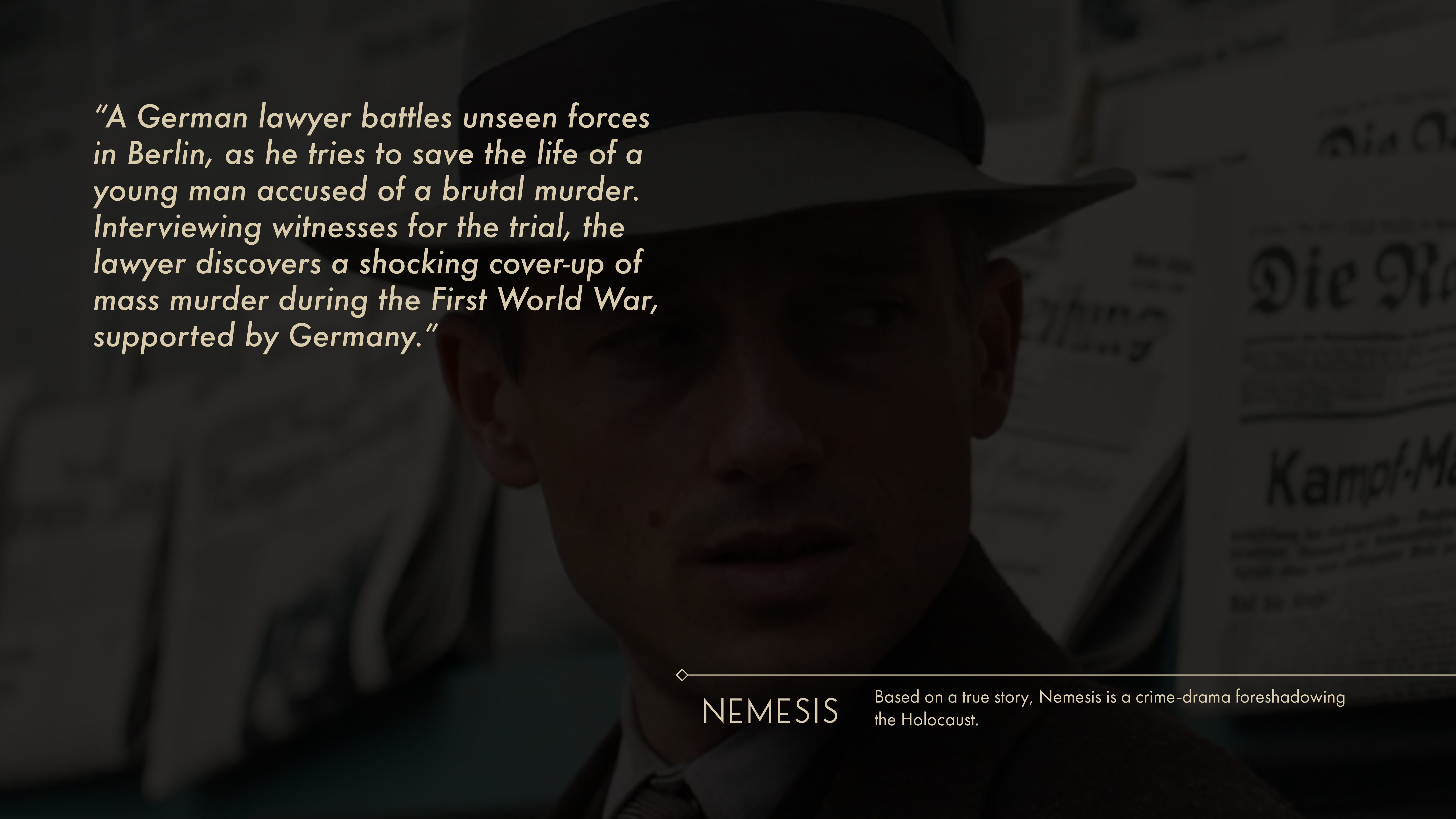



Synopsis
Soghomon, a young Armenian, kills a
German citizen in broad daylight. Why?
The man Soghomon killed, Talaat Pasha,
leader of the "Young Turks," had been
found guilty of war crimes in Istanbul, and
was living under an assumed name in
Berlin. Soghomon killed him because Talaat
was responsible for the massacre of his
family and all the Armenians in Turkey in
1915. Werthauer agrees to defend Soghomon.
Soghomon will get the death penalty if found
guilty.
Werthauer's boss, Von Gordon, tempted by
the fee, thinks they should take the case,
using "temporary insanity" as the legal
defense.
Werthauer isn't sure.
Soghomon explains he was an "orphan gatherer,"
saving young children during the Genocide.
Werthauer and his assistant, Dagmar, interview
witnesses who confirm that Germany knew about
Turkey's plan to exterminate the Armenian
population.

Berlin 1921
The witnesses confirm the horrific details of the Turks' methods, and photographs and telegrams show that Soghomon had every reason to kill Talaat. Gustav is violently assaulted and ends up in hospital
A telegram can prove the Young Turks' guilt. A last-minute witness confirms 1.5 million Armenians were killed in Turkey. But Von Gordon is pressured by Germany’s new leaders to ensure the trial is not ‘political’ or the country will be blamed for Turkey’s crimes. The trial begins. It’s supposed to last one week. But the Judge says they will only have two days -- no time for any of the witnesses Werthauer secured.

After all, Hitler says, “who remembers the Armenians?”

The case against Soghomon looks increasingly
bad. The Prosecutor argues Soghomon could
not have found Talaat without help from coconspirators. The death penalty looms.
Von Gordon accuses Werthauer of not
putting Germany’s interests first, because
Werthauer is a Jew.
The trial ends the next
day, with Werthauer changing his strategy at
the last minute.
Werthauer dazzles the jury making the
closing argument of his career. But Von
Gordon slyly adds that if the jury finds
Soghomon innocent, Germany will not be
associated with Turkey's crimes. The jury finds
Soghomon innocent. But Werthauer feels
defeated.
It was the right verdict for the wrong reason.
Germany was complicit in the Armenian
Genocide. Werthauer couldn't prove it.
Dagmar distributes Wegner's photographs of the
genocide to the international press, as well as
Talaat's telegrams.
The story ends with Werthauer telling
Soghomon he knows he was part of NEMESIS,
a political conspiracy to assassinate the Young
Turk leaders.
The film ends with the quote by Hitler.
THE DIRECTOR’S STATEMENT Carla Garapedian
As a grandchild of genocide survivors, I grew up with the story of NEMESIS 1921. But whenever we talked about it, we whispered. The idea that one man should try to avenge a genocide by killing the leader responsible for it -- that made us proud but concerned. Justice was left to a vigilante! This movie is a crime drama -- murder, investigation and trial. I tell the story through the eyes of the defense lawyer, Johannes Werthauer, who is reviled by the far right. His reluctance to take Soghomon's case turns into fascination. A simple murder will lead to a big reveal -- a moment that shows something very dark in all of us -- then and now.
Werthauer’s investigation in Berlin and the surrounding countryside is a tour through pre-Nazi Germany. We see the contrasts: poverty vs nouveau riche, rural vs urban, residents vs post-war immigrants. Berlin is a bare, stark, hungry and stunned city. There is random violence on the streets. Germans are wary and angry. It is not a dystopia -- but it could become one. Like the classics -- The Conformist, The Verdict, Judgement at Nuremberg and Witness for the Prosecution, the colors and contrasts reflect Werthauer's personal journey.
I was trained in the British documentary
school, with an emphasis on stories that use
the personal journey of a reporter who goes
into the "heart of darkness" to discover the
truth. This film does the same.
While our story is driven by Werthauer's
subjective journey, the world he witnesses is
seen with a documentary lens. The camera
is always searching for truth, but also
searching for humanity -- whether in
someone's face, a haunting landscape or a
brutal killing.
Why this story now?
Period crime dramas are popular now because
the classic “who-dun-it” is a motif we can use
to explore our current anxieties and traumas.
Tarentino started this trend. It has continued
with crime dramas like Peaky Blinders and
Sherlock Holmes.
There's a hunger for it.
2021 will be the 100th anniversary of the
NEMESIS trial. Only in recent years has
Germany come to terms with it. The trial has
been popularized in books, on stage and in
several graphic novels, but never on the big
screen.
The time to tell this story is now.